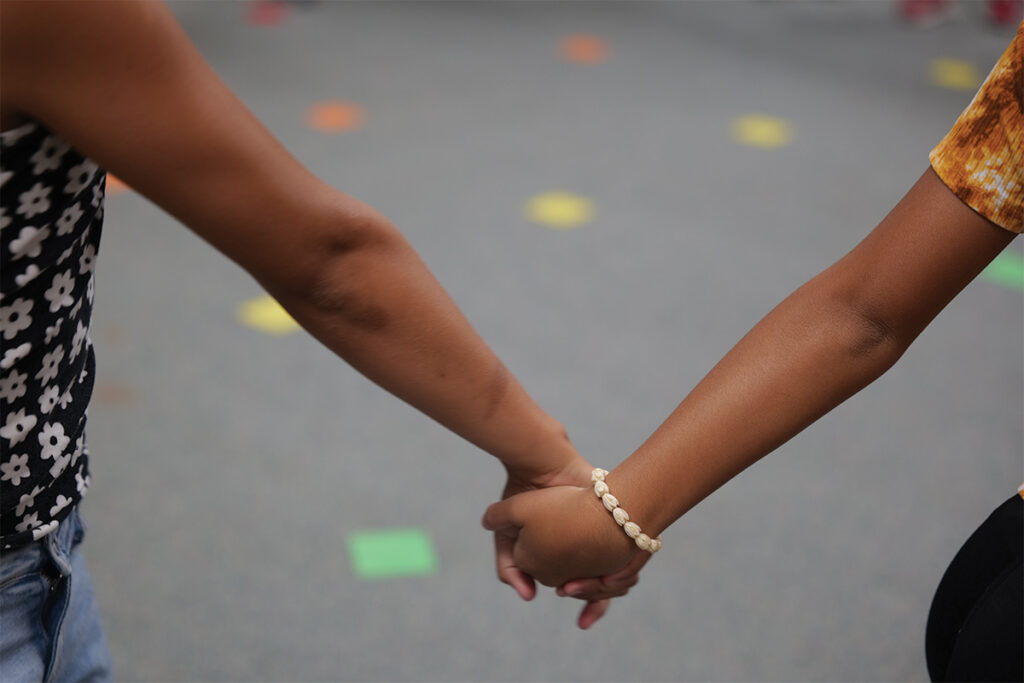Our Hawaiʻi public schools believe every student deserves a safe, respectful learning environment—both in school and online. 霸凌, in any form, undermines the well-being and success of students. That’s why we are committed to empowering students, families and communities with tools and resources to prevent and address bullying. From proactive prevention programs to easy-to-use reporting tools like the 立即發言 HIDOE 應用程式我們與社區攜手合作,弘揚尊重、責任與同理心的文化。我們可以共同確保每個學生都感受到支持和安全,讓他們能夠在學業和情感上茁壯成長。

What is 霸凌?
霸凌 is a serious issue that affects students of all ages and backgrounds. While there are many forms of bullying, we’ll be focusing on two primary categories: bullying 和 cyberbullying. Understanding these two types is important so we can all work together to create a safer and more respectful school environment.
“Bullying”—任何以書面、口頭、圖像或身體形式傷害、損害、羞辱或恐嚇學生(包括具有受保護階層地位的學生)的行為,這些行為足夠嚴重、持續或普遍,以致形成一種恐嚇、威脅或虐待的教育環境。
“Cyberbullying”—electronically transmitted acts, including but not limited to those transmitted through the Internet, cell phone, or other wireless hand-held device initiated by one student toward another student or employee of the department that hurts, harms, humiliates, or intimidates the student or employee; and is sufficiently severe, persistent or pervasive, that it creates an intimidating, threatening, or abusive educational environment. Cyberbullying can occur:
- 在校園內、其他部門場所內、部門交通工具上、或在部門贊助的校內或校外活動或事件期間;
- 透過未經部門授權的部門資料系統進行通訊;或者
- 透過校外電腦網絡,如果該行為影響教育環境。
Additionally, cyberbullying may also be based on a person’s protected class, including but not limited to, a person’s race, color, religion, sex, sexual orientation, gender identity, gender expression, age, national origin, ancestry, disability, physical appearance and characteristics, and socio-economic status.
managing bullying
霸凌 is a Community Issue
霸凌 belongs to all of us. School staff can address incidents and support students at school, but they cannot stop bullying—in all its forms, and in all the places it occurs—on their own. Families, students, and communities have a role to play to adopt and promote a culture of respect, responsibility and resiliency.
我們敦促家人與孩子交談,要尊重和同情他人,包括那些與自己不同的人。在我們的學校裡,我們培養這些特質,作為 Nā Hopena Aʻo, social-emotional learning, and other efforts. While bullying can happen to anyone, students may also be targeted because of race, socio-economic status, sexual orientation, gender identity, learning disabilities and other qualities; a violation of 民權法.
Community-wide strategies can help identify and support children who are bullied, redirect the behavior of children who bully, and change the attitudes of adults and youth who tolerate bullying behaviors in peer groups, schools, families and communities.
Our Response to 霸凌
- 預防: All schools are invested in building a positive school culture and climate to encourage all students to be respectful and empathetic. To address bullying behaviors schools may be implementing one or more of the following:
- 全校範圍的正向行為實踐,教導學生成為尊重他人、負責任和富有同情心的學習者。
- Anti-Bullying 程式: Communities are unique, and schools have different approaches based on their community’s needs. Some schools have students leading their anti-bullying efforts.
- Community Partnerships: Many schools cultivate relationships with community agencies, health and wellness providers, policing and community policing groups, legal advisors, cultural practitioners and others to broaden supports.
- 回覆: 當事件發生時,校長或其指定人員將進行調查:
- 確定是否構成夏威夷行政法規 (HAR) 所定義的犯罪 第 19 章 (PDF) 發生。
- 在該部門的學生支援資料庫中進行登記,這使得學校能夠隨著時間的推移識別、監控和追蹤學生關注的問題。
- 後續行動: School staff provide supports to victims and bullies to address ongoing conditions that may have contributed to the bullying incident and to help prevent future incidents. These conditions may include issues at home, stress, abuse, and health, social-emotional and behavioral health issues, among others.
Report bullying
Any child who is bullied or who witnesses a bullying incident is encouraged to tell a trusted adult or report it using the Chapter 19 Complaint form or the anonymous 立即發言 HIDOE 應用程式. If an incident happens on our school campuses, on HIDOE transportation, or during a HIDOE-sponsored event, appropriate school personnel will investigate.
Speak Now
HIDOE has an app that allows students to report bullying incidents. Our 立即發言 HIDOE 報告應用程序 offers elementary, middle and high school students a way to report bullying incidents—digitally and anonymously, if they choose—that happen on campus, on HIDOE transportation, or at HIDOE-sponsored events.
- 觀看下面的視頻,了解如何使用該應用程式提交小費的分步演示。
- 立即發言 HIDOE 報告應用程式傳單 (PDF)
如何提交小費
四至六年級小學生
7-12 年級國中學生
學生不當行為與紀律
第十九章
夏威夷行政法規第 19 章規定了與學生不當行為有關的問題, which includes bullying, harassment and cyberbullying. It’s important that students and parents review this information to be aware of what constitutes a Chapter 19 violation, and what the consequences are.
下載夏威夷行政法規第 19 章:
Chapter 19 Translated Parent Letters
The Department recognizes the need for these important letters to be translated into their native languages for our families to review and download. They include:
- Chapter 19 Parent Letter
- Firearms Parent Letter
- Electronic Smoking Device Parent Letter
青少年危險行為調查
青少年風險行為調查(YRBS)監測中學生廣泛的健康相關行為,包括導致意外傷害和暴力的健康風險行為;吸煙;酒精和其他藥物的使用;與意外懷孕和性傳染病有關的性行為;不健康的飲食行為;以及缺乏身體活動。 YRBS 每隔一年進行一次,與國家資料收集和分析工作相結合,由 美國疾病管制與預防中心. The Hawaiʻi YRBS is a joint effort of the Hawaiʻi State Departments of Education (HIDOE), Department of Health (DOH), and the University of Hawaiʻi’s Curriculum Research & Development Group. The Hawaiʻi YRBS data and reports are available on the 夏威夷健康資料倉儲.
